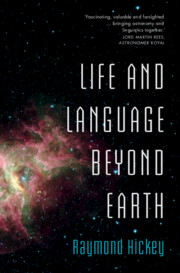Book contents
- Life and Language Beyond Earth
- Reviews
- Life and Language Beyond Earth
- Copyright page
- Contents
- Tables and Figures
- Preface
- How to Use This Book
- Part I Introduction
- Part II The Universe We Live In
- Part III Our Story on Earth
- Part IV The Runaway Brain
- Part V Language, Our Greatest Gift
- 20 Looking at Language
- 21 Talking about Language
- 22 The View from Linguistics
- 23 The Language Faculty and Languages
- 24 Language and the Brain
- 25 Acquiring Language
- 26 Humans and Animals
- Part VI Life and Language, Here and Beyond
- Book part
- Glossary
- Timelines
- Figure credits
- References
- Bibliography
- Index
22 - The View from Linguistics
from Part V - Language, Our Greatest Gift
Published online by Cambridge University Press: 16 September 2023
- Life and Language Beyond Earth
- Reviews
- Life and Language Beyond Earth
- Copyright page
- Contents
- Tables and Figures
- Preface
- How to Use This Book
- Part I Introduction
- Part II The Universe We Live In
- Part III Our Story on Earth
- Part IV The Runaway Brain
- Part V Language, Our Greatest Gift
- 20 Looking at Language
- 21 Talking about Language
- 22 The View from Linguistics
- 23 The Language Faculty and Languages
- 24 Language and the Brain
- 25 Acquiring Language
- 26 Humans and Animals
- Part VI Life and Language, Here and Beyond
- Book part
- Glossary
- Timelines
- Figure credits
- References
- Bibliography
- Index
Summary
Linguistics is the study of the human language faculty and the languages it engenders. It enjoys interfaces with other sciences such as cognitive psychology, neurobiology and physiology. The borders between linguistics and other sciences are fluid and have shifted with increasing research in the field. Where we draw the lines is a matter of debate among scientists, but we do draw them because science compartmentalises reality for the purpose of inquiry and analysis.1
For some two centuries linguistics has been an established branch of science, and considerable strides have been made in researching how humans speak, how they acquire their native language and in documenting the known languages of the world. This knowledge has been arrived at by devising means for analysing human language and by adopting approaches based on notions which are likely to be quite different from the views which non-linguists will have about the subject.
- Type
- Chapter
- Information
- Life and Language Beyond Earth , pp. 359 - 377Publisher: Cambridge University PressPrint publication year: 2023

